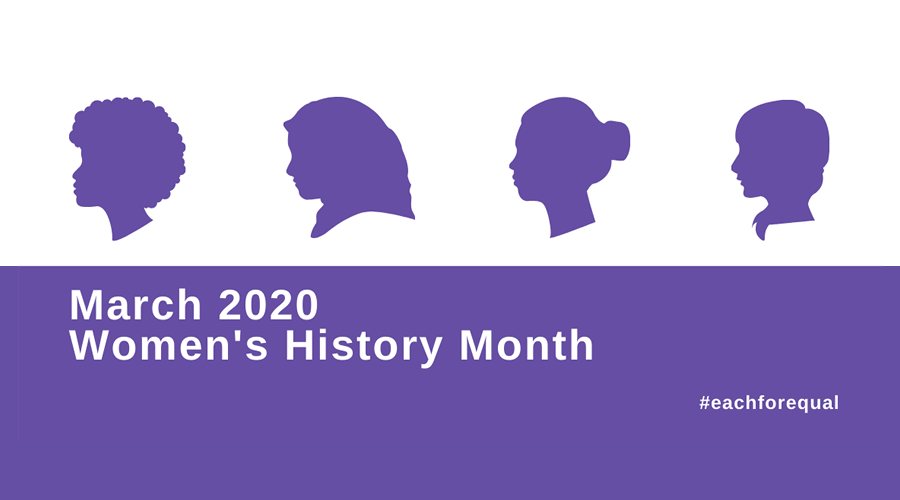Each week in March, we are spotlighting the many talented women working at Bloom Energy. We will be sharing the unique stories and perspectives of women in our workforce with an intended goal of raising awareness on workplace bias and encouraging discussions of the International Women’s Day 2020 campaign theme of #EachforEqual, where an equal world is an enabled world. Below are key themes that you will see throughout our Women’s Month profile series:
Gender Equality
UNICEF states gender equality “means that women and men, and girls and boys, enjoy the same rights, resources, opportunities and protections. It does not require that girls and boys, or women and men, be the same, or that they be treated exactly alike.”
A generalized view or preconception about attributes or characteristics, or the roles that are or ought to be possessed by, or performed by women and men. A gender stereotype is harmful when it limits women’s and men’s capacity to develop their personal abilities, pursue their professional careers and make choices about their lives.
Unfair difference in the way women and men are treated.
An interview with Aimee DuBois, Manufacturing Supervisor, Fuel Cell Assembly
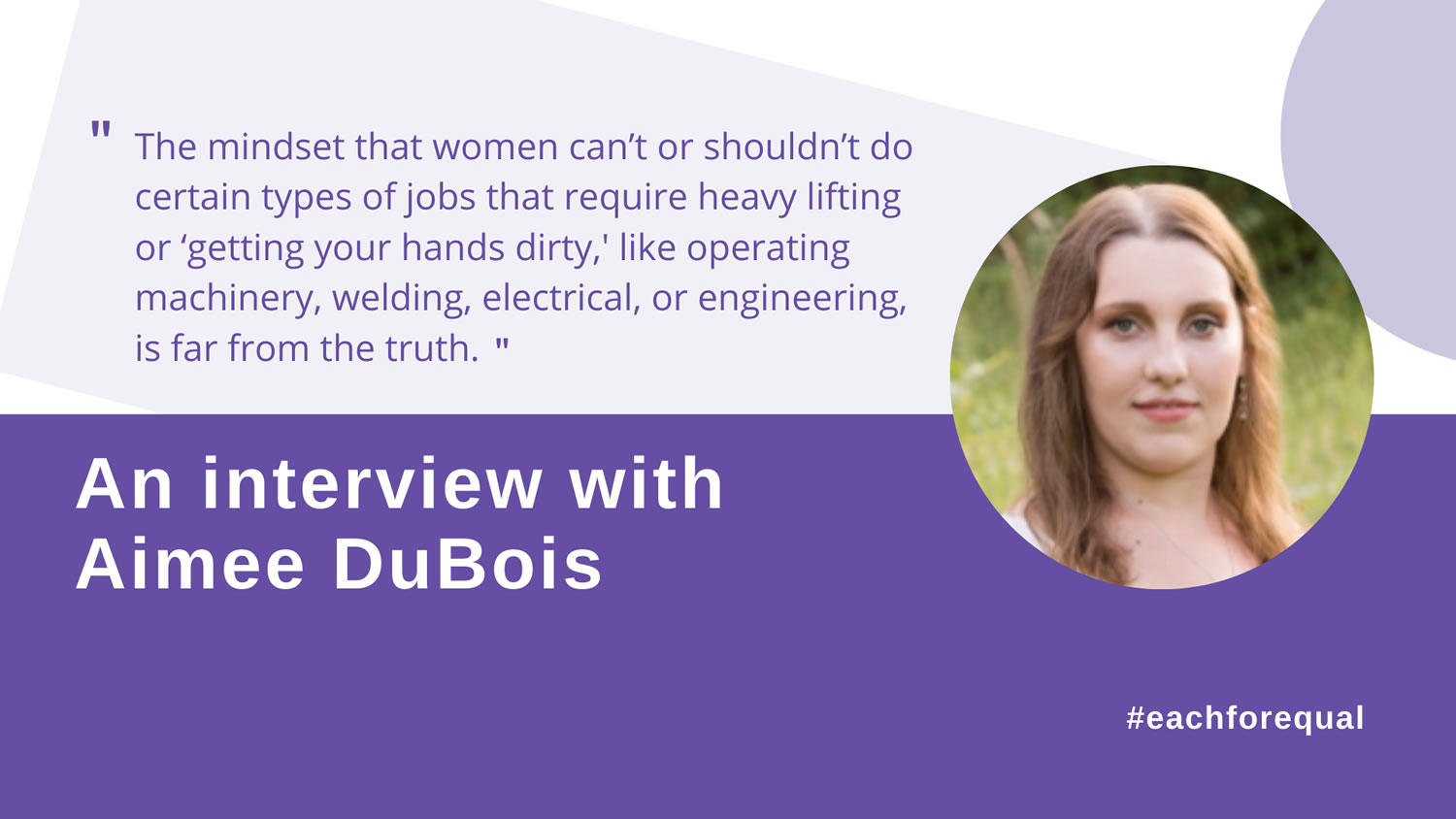
A few months shy of her six-year work anniversary, Aimee Dubois was promoted to a manufacturing supervisor at Bloom’s Manufacturing Center in Delaware (BMCD); the first female manufacturing supervisor at the facility.
As a business technology graduate from Delcastle Vocational Technical High School, on track to enter the banking industry, Aimee never imagined a career in manufacturing. Now with 15 years of experience in manufacturing and 10 years in the renewable energy space, she has found an opportunity to build upon her strengths by leading and developing a team of assembly line workers and welders.
1. What is your perspective on gender equality today?
Gender equality is moving in the right direction, but still has many obstacles to overcome. The mindset that women can’t or shouldn’t do certain types of jobs that require heavy lifting or ‘getting your hands dirty,’ like operating machinery, welding, electrical, or engineering, is far from the truth. Women in these industries are continuing to excel on all levels, and often times women are top performers.
A promising workforce change that is already progressing is more women in the workplace at all levels of business.
We need to work together to remove stereotypes by continuing to educate and positively influence people’s mindsets on inclusion and diversity so that everyone has the opportunity to reach their full potential.
2. What would workforce gender equality look like to you?
To me, workforce gender equality will be achieved when everyone has the same opportunities and equal pay for equal work. Workplaces should be an environment where both women and men are motivated to work, feel rewarded, and respected for their contributions, regardless of gender.
3. If you manage others, do you experience resistance when you are leading men? What helps/or has helped you work through these situations?
Unfortunately, in the past, I have experienced resistance leading men. I found what helped me work through these situations was maintaining respect, building trust, and effectively communicating with my team.
4. In your everyday role, how do you work to dismantle gender stereotypes?
I’m proud to be part of a company where gender diversity and inclusion is embraced and valued – staying true to Bloom’s culture of ‘Respect for People’.
5. Only 15% of the oil and gas industry workforce is women – the lowest out of all industries. With climate change pressing, innovation in the energy industry is largely dependent on diversity. What can the energy industry do to grow inclusion and diversity?
 The energy industry has made great progress over the years. In the last six years alone, I have personally seen more women entering STEM careers and leadership roles. My journey in manufacturing has provided me with multiple opportunities for growth with awesome mentors supporting my development throughout the past 15 years. However, there were times when my experiences were not positive. I have encountered men and women in previous jobs who made it very difficult to advance, either by discriminating against my age, body strength, work experience, or gender. These experiences have contributed to the person I am today and have taught me how to overcome and help change the mindset of those who are not as supportive of women in this industry.
The energy industry has made great progress over the years. In the last six years alone, I have personally seen more women entering STEM careers and leadership roles. My journey in manufacturing has provided me with multiple opportunities for growth with awesome mentors supporting my development throughout the past 15 years. However, there were times when my experiences were not positive. I have encountered men and women in previous jobs who made it very difficult to advance, either by discriminating against my age, body strength, work experience, or gender. These experiences have contributed to the person I am today and have taught me how to overcome and help change the mindset of those who are not as supportive of women in this industry.
In my opinion, to achieve continual growth with inclusion and diversity, the industry needs to build dedicated inclusion and diversity programs into organizations.
6. Who has inspired you and why?
One of the many individuals who has inspired me is my grandmother. In addition to educating me on numerous life skills, she made sure to teach me three important lessons: never forget where you came from, appreciate the little things in life, and be kind to others.
7. What’s one core message you have received from your mentors?
My mentors have taught me to continuously strive to be a lifelong learner, be confident, find common ground, and acknowledge what you don’t know.
8. What advice would you give to the next generation of women entering their career?
Always have confidence in your own abilities, stay relevant, keep learning from those around you, and seek opportunities to collaborate with others. It’s important to identify your weaknesses and build upon your strengths to open opportunities for yourself.
Aimee gives us a powerful sendoff as we wrap up our Women’s Month series. The discussion doesn’t end on March 31st, though; we each play a continual role in creating a world that embraces #eachforequal.
We encourage you to continue reading and sharing insights from our Women’s Month series!
An interview with Judy Wong, Senior Director of Structured Finance
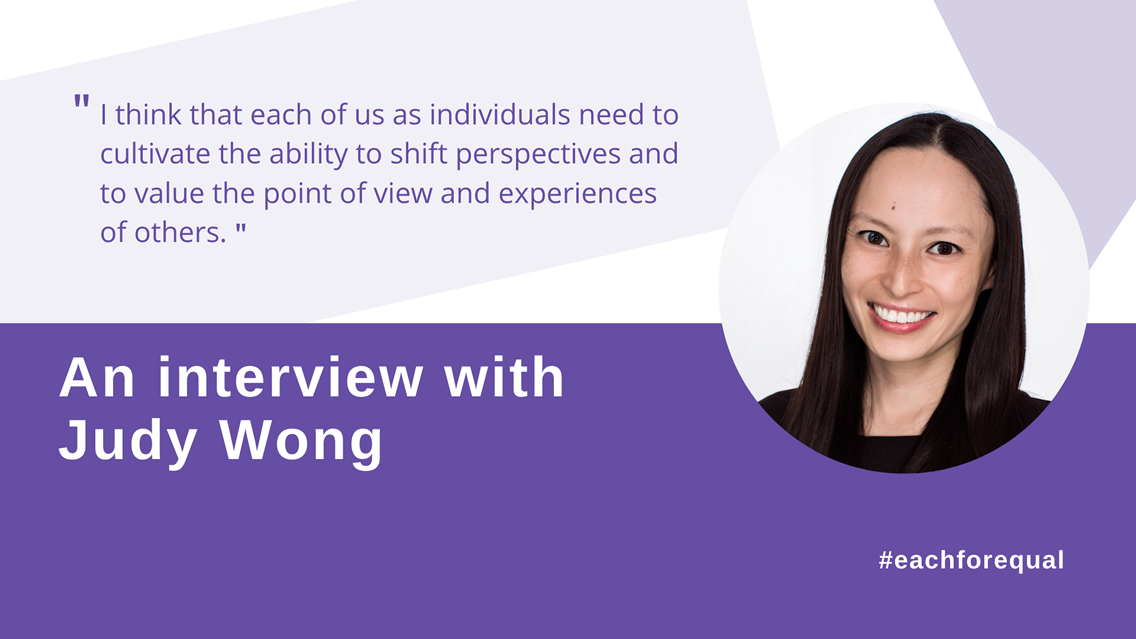
With 20 years of experience, Judy’s career spans both investing and finance. As a senior director, structured finance at Bloom Energy, she brings an expertise with energy and infrastructure transactions to her role in managing strategic partnerships and Bloom’s carbon capture initiatives.
1. This year, the International Women’s Day theme is #EachforEqual, as an equal world is an enabled world. What is your perspective on gender equality today?
I think there are obvious and not so obvious ways in which women still do not have equality with men. I am very optimistic, though, about this continuing to change and I recognize that we have made a lot of progress, even in my relatively short time on Earth.
One thing that gives me a lot of encouragement is the subtle change in language from “maternity leave” to “parental leave.” I think this is wonderful because it speaks to the recognition and normalization of the role of fathers in childcare, especially in the early years. Childcare, work/life balance, navigating dual career paths – these are now being framed as family issues rather than “women’s issues.”
I love that men of my generation sincerely want to be good fathers – they want to be present and involved in their children’s lives, and often think of themselves as primary caretakers (as opposed to backup babysitters). To my mother, this is a revolutionary development! I am optimistic that a model of true equality/partnership in the home translates to equality in the workforce, and vice versa.
2. What would workforce gender equality look like to you?
If we are able to achieve this, I think you’ll naturally see a lot more women in leadership and executive roles.
3. Within your field of expertise, what do you see as a promising workforce change that is currently underway or already progressing?
A macro trend that truly makes me smile is the growing predominance of ESG (Environmental, Social, and Governance) in investing.
I started my career in impact investing, and our approach was definitely not seen as mainstream. Now, we are seeing some really hard-nosed finance-types integrating ESG considerations into their investment decisions – JP Morgan set up a development bank, KKR raised a Global Impact Fund, TPG closed the Rise Fund, BlackRock, Blackstone, etc.
Investors have a huge influence on the opportunities that companies pursue and the businesses that get created. I believe that channeling the power of business to solve social and environmental problems can truly change the world.
4. Only 15% of the oil and gas industry workforce is women – the lowest out of all industries. With climate change pressing, innovation in the energy industry is largely dependent on diversity. In your opinion, what can the energy industry do to grow inclusion and diversity?
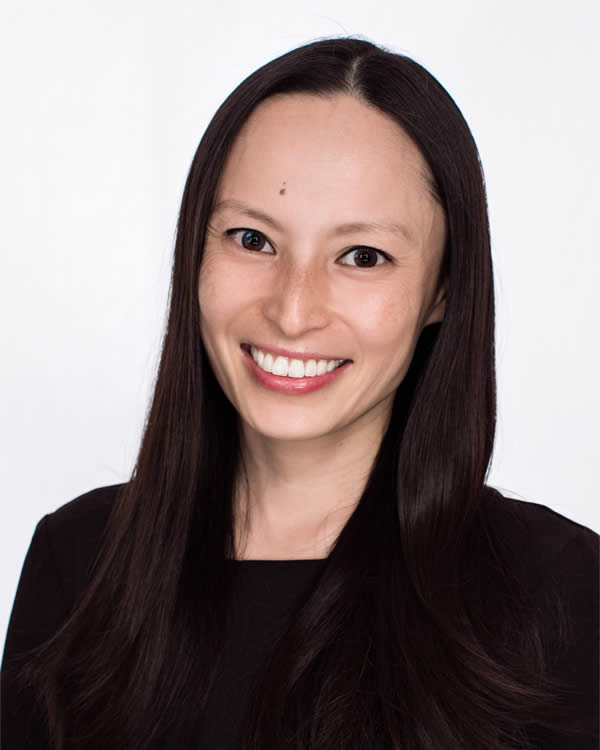 There is a lot of talk in the energy industry about the “pipeline problem” –women and girls don’t choose STEM fields, so that there are not enough women to hire into technical positions, and so on up into leadership roles.
There is a lot of talk in the energy industry about the “pipeline problem” –women and girls don’t choose STEM fields, so that there are not enough women to hire into technical positions, and so on up into leadership roles.
But, why do women seemingly opt-out of STEM or other male-dominated fields such as finance? It’s certainly not because science, technology, finance, or energy are inherently harder subjects for women and girls to master. For many reasons, it can be hard for women to advance in a man’s world.
Inclusion is about valuing contributions and ideas from people who may be different from you. Simply having diversity isn’t enough – you need a culture of inclusion in order for women to thrive and advance. My hope is that this sets off a virtuous cycle, where women succeed and fully realize their potential, companies benefit from their talent, and more young women see themselves in roles that aren’t traditionally open to them.
Notwithstanding the low percentage of women in energy today, I think we have made great strides and I’m very optimistic about the future of women in energy.
5. What is the toughest career challenges you’ve faced? Tell us about the actions you took, lessons you learned, and how it contributed to a greater success.
Transitioning to being a working mother. Going back to work after the birth of each of my children was an immense challenge – battling sleep deprivation, trying to meet my commitments at work and meeting the demands of a newborn plus a toddler. Babies don’t care about your schedule and most workplaces expect you to meet your deadlines regardless of what’s happening at home.
I learned how to be calm and in the moment in order to manage stress, competing demands, and the problem I am trying to solve. I think the balance that I continue to cultivate through the ongoing challenge of working parenthood makes me both a better person and professional.
6. As both a mother and career professional, what is your perspective on work and life balance?
Over time, I have come to see work and life as inseparable. I think it is hard to thrive in one sphere while suffering in the other, because emotions cross work-life boundaries. It is important to me to be happy and content at work and at home. For me, this means that I want my work to have purpose and to contribute meaningfully in some way. I also need the time and space to be present with my family and to pursue other interests.
7. What’s one core message you received from your mentors?
8. Any advice you can give those women entering male-dominated professions such as investment banking?
Trust that you have immense value to contribute.
Judy’s #eachforequal insights are an excellent reminder that even small changes, like changes in the language we use to describe topics, can make big ripples in advancing gender equality. In case you missed our first two Women’s Month interviews, you can read them below.
And be sure to stay tuned for our next Women’s Month spotlight!
An interview with Kalpana M., Principal Engineer of Global Data Management
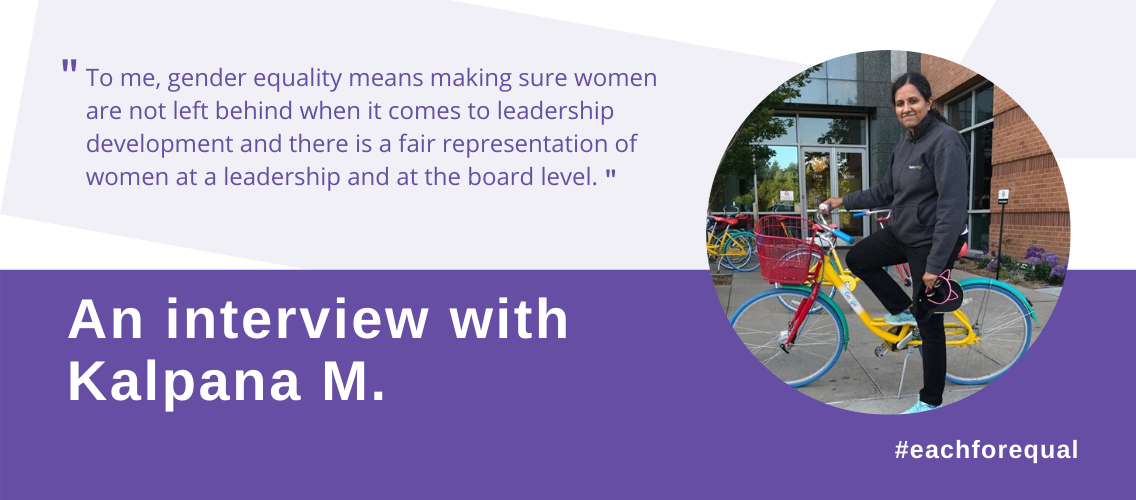
This year will mark Kalpana’s 11th year at Bloom Energy, where she specializes in bringing data stacks together from different business applications to help business leaders make more informed decisions. When she first joined Bloom’s Bangalore team, members of her team were comfortable working with data in Microsoft Excel spreadsheets.
With her persistent ‘behind the scenes’ efforts to build a more reliable and efficient data mining and warehousing tool, the days of relying on Excel-driven culture has transitioned to system-aided decision making.
1. What is your perspective on work and life balance?
I firmly believe in this quote by Heather Schuck, which says, “You will never feel truly satisfied by work until you are satisfied by life.” As a working mom, I place a lot of emphasis on a balanced outlook.
While a strong work ethic enables me to devote time to things that I am passionate about outside of work, I am also fortunate to have the necessary support system.
2. Describe one of the toughest career challenges you’ve faced. Can you tell us how you navigated the situation, including lessons you learned along the way?
In a prior role, where I had a client-facing position as a project manager, I was working with a demanding customer and the delivery schedule was constricted. It was a critical project both for my former organization and the customer as it was related to their billing.
The project was escalated due to the response time and complexity, and this was happening around the same time that I was getting married. The demanding nature of not having enough resources to complete the project, in addition to this personal milestone, was affecting me personally. I had to handle the situation deftly, since stakes were high.
I took it upon myself, organizing a meeting with the center head to get capable resources. In the end, I got the necessary support and the project was handed over on time to the customer. While it definitely helped me scale the learning curve, important lessons for me were to give adequate attention to resourcing and scheduling and to flag concerns at the early stages of a project.
3. Do you experience resistance when you are leading men? What helps/or has helped you work through these situations?
I have not faced any issue so far while leading men in my team. In most of the cases, I have been able to guide my team to work together towards a compelling vision.
4. How do you work to dismantle gender stereotypes?
We have a clear rule in our home – household chores aren’t gender specific. Chores are taken up by me and my spouse on a rotational basis. We have a daughter that we make sure gets exposure to a wide variety of toys. We go by the notion that “toys are toys for both girls and boys.” We also encourage her to embrace adventure and engage in active sports not traditionally seen as “ladylike.”
5. What would workforce gender equality look like to you?
6. Who has inspired you and why?
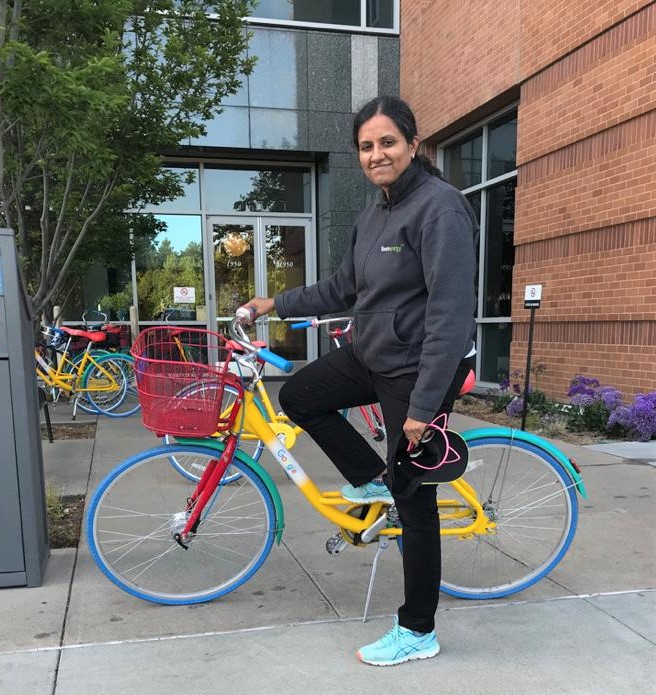 We get inspired by various people along the course of our life.
We get inspired by various people along the course of our life.
The person who inspires me the most is the author J.K Rowling, who went from being a jobless, single mother living off unemployment benefits to one of the bestselling authors of all time. Despite numerous setbacks, she found solace in doing what she loved the most, writing. I am a big fan of her books. In her own words, “Failure meant a stripping away of inessential. I stopped pretending to myself that I was anything other than what I was, and began to direct all my energy into finishing the only work that mattered to me.”
Life lessons for me are – if you have a passion and keep meeting obstacles, don’t give up. If you are going through a tough time in your life but working on something you believe in, don’t shut yourself up.
7. What advice would you give to the next generation of women?
Be stubborn and keep trying, because even if you work with passion and are really good at what you do, you are likely to be subject to preconceived notions of who can do what.
In general, wealth can be hidden but capability and intellect can never be concealed.
8. Any last words of wisdom to share?
“Believe in yourself and the world will be at your feet” – by Swami Vivekananda, an influential Indian monk.
I am extremely happy to be associated with Bloom Energy, since the company has given me an opportunity to fall in love with my work, again.
Thank you Kalpana for sharing your #eachforequal insights and sparking inspiration! In case you missed our first Women’s Month profile, you can read it below.
And of course, be sure to stay tuned for next week’s spotlight!
An interview with Sara Mulhauser, Senior Manager of Structured Finance
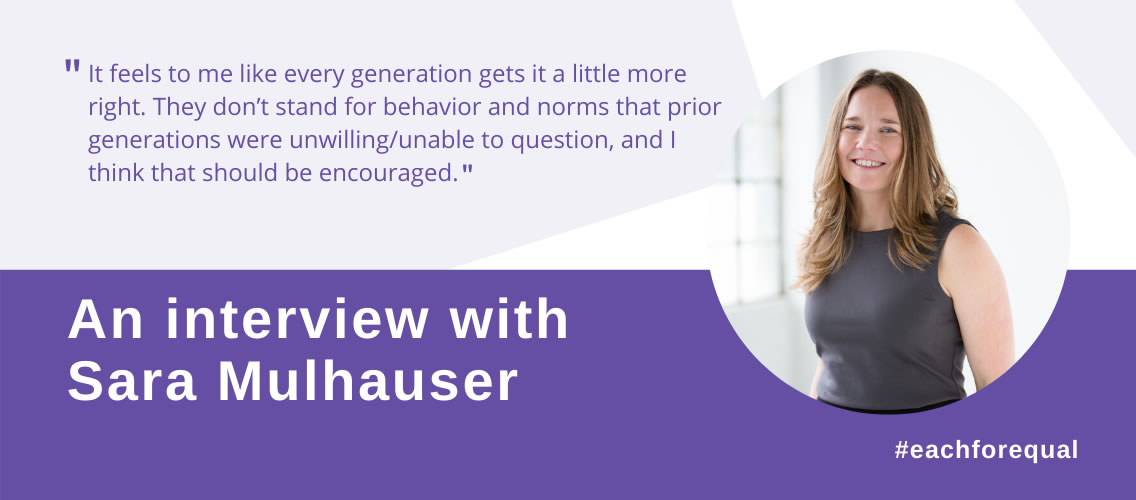
Sara Mulhauser has worked at Bloom for the last ten years, starting out in installations and operations before transitioning into finance. With prior experience in operations and construction, she now acts as a liaison for installation technicalities, policy, and operational questions that arise during the due diligence phase of financial dealings and exploratory efforts.
Having worked in traditionally male-dominated fields, spanning architecture, construction, and energy, we asked Sara a series of questions, reflecting on both successes and challenges encountered throughout her career. Let’s dive in!
1. Educational, political, and economic gender inequality can affect a woman’s daily life, sometimes in multiple ways. Have you ever personally experienced gender inequality in the workplace?
I was lucky to start my career in an industry (architecture) that has a slightly better record than others in providing opportunities to women on par with men. I always had very strong female role models and mentors at the firms I worked. Construction job sites offered the opportunity to be the lone female, and one with relative authority, in largely all-male environments. My brushes with inequity in the work place have been thankfully limited, but that obviously isn’t everyone’s experience.
2. In your opinion, how can we combat gender inequality?
“Combating inequity requires recognition of the inequity, and then someone with enough political power and a will to address it.”
It can be meaningful if that person addressing it is someone who already has the better end of the fairness scale, but it doesn’t have to be. Political power and political will can be encouraged at all levels of an organization, and addressing inequities can happen quietly, interpersonally, or with bold, public moves. I think the advances against inequity that we have witnessed occurred only because people have attacked the problem from so many different perspectives, and with so many different tools.
3. What do you see as a promising workforce change currently underway or already progressing?
It feels to me like every generation gets it a little more right. They don’t stand for behavior and norms that prior generations were unwilling/unable to question, and I think that should be encouraged.
I also love seeing men take paternity leave. Doing so can not only serve your family well, but it can be an enabler of the women around you.
4. What would workforce gender equality look like to you?
The low-hanging fruit is pay inequity – I’m sure large employers review relative pay by gender. In a similar way that we see voluntary reporting on sustainability, I’d love to see voluntary reporting on that.
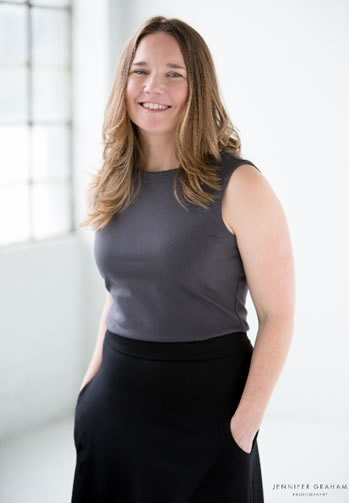 5. As a manager, do you experience resistance when you are leading men? What has helped you work through these situations?
5. As a manager, do you experience resistance when you are leading men? What has helped you work through these situations?
I haven’t experienced resistance when I’ve managed men directly. Serving in a capacity where I had to manage men through a process, but not as their superior (project managers often have to do this) sometimes presents a challenge. I feel particularly challenged when people talk over me, since my communication style typically allows room for others to speak. If their communication style is domineering, it may limit my ability to effectively manage the process I am there to manage. I wouldn’t say I’ve perfected a particular method of working through that – sometimes being more assertive is best, sometimes it can be more helpful to line up an ally ahead of time who is in the room and in a better position to manage that person. There’s no one right way to do it.
6. What is one core message you received from your mentors?
“You are smarter than you give yourself credit for being. The sooner you realize that, the sooner you’ll demand a seat at the right table.”
7. What advice would you give to the next generation of women?
Don’t be afraid to do what you are truly interested in. There are lots of paths, and a majority of them are non-linear. Your interests will probably change over time, but that doesn’t mean the hard work to achieve one career milestone is invalidated if you take a different path later.
8. What advice would you share with young women entering a male-dominated profession?
I don’t think women entering a male-dominated profession have trouble getting in; the trouble comes with advancing in that profession.
“In the early parts of your career, seek out mentors you are interested in or intimidated by. Talk with them even if you don’t know what to ask them – you end up learning a lot when others share their experiences, which can help you develop strategic ideas without having to learn their hard lessons. And, if it goes well, they can be an advocate for you.”
A big thanks to Sara for kicking off the month with words of wisdom that will continue to inspire the #eachforequal discussion.
Be sure to stay tuned for next week’s Women’s Month interview!
Check out the Bloom Women’s Series on our YouTube channel for more perspectives
